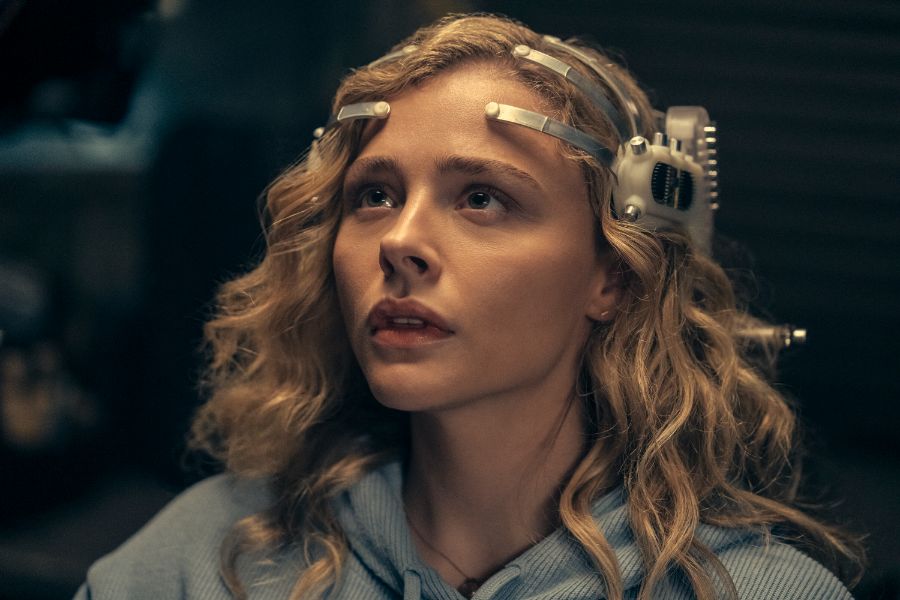“It’s a point of pride, Wilf. I don’t lie to my friends. So please take some care in what you ask. I’d hate to stop thinking of you as a friend.”

The Peripheral is a phenomenal new Amazon Studios series streaming now on Prime. The show is an adaptation of the 2014 novel of the same name by the award-winning, visionary, futurist author, William Gibson. Created for television and written by Scott B. Smith, The Peripheral is directed by Vincenzo Natali and Alrick Riley. The series stars Chloë Grace Moretz and Gary Carr along with Jack Raynor, Eli Goree, Charlotte Riley, JJ Field, T’Nia Miller, Katie Leung, Melinda Page Hamilton, and Louis Herthum. The Peripheral is a mind-bending, temporally-twisting, taut, and action-packed science-fiction tale that leans heavily on the precepts espoused in the George Orwell quote, “Who controls the past controls the future.”
2099 London is a sprawling, utopian metropolis. Scientists of the Research Institute led by Cherise Nuland (Miller) have developed a technology called “Quantum Tunneling” that allows them to transmit data through time, giving them the ability to exploit and manipulate events in the past so that their future is insured and enhanced. This gleaming city of the future stands on a cracked foundation made of horrible tragedies, and a woman named Aelita West (Riley) is determined to do something about that. She cryptically informs her adopted brother Wilf Netherton (Carr) of her intentions and then vanishes off the grid.
In the year 2032, Flynne Fisher (Moretz) is a quick and perceptive young woman who lives in the sleepy town of Clanton, North Carolina, nestled near the Blue Ridge Mountains. When not working at the Forever Fab 3D print shop, she cares for her ailing mother Ella (Page Hamilton), who is bedridden and blinded by an inoperable tumor, and her older brother Burton (Raynor) a Marine veteran. A member of the elite Haptic Recon teams, he is suffering from PTSD and wracked with pain from faulty implants. He and the other retired members of his team make money on the side from competitive First Person Shooters, though often Flynne will step in and take Burton’s place when the team is in a tight spot or he is otherwise unavailable, typically turning the tide in their favor.
One day, an order comes in at the print shop for Burton and when fabricated it is revealed to be a sophisticated, silvery, spider-like headset more advanced than anything Flynne has ever seen before. Burton tells her that he’s been hired by a Bogota-based company called Milagros Coldiron and is being paid to beta-test a new graphic-user interface. He offers to give Flynne a crack at it.
Donning the headset dubiously, she gives a doubtful look to Burt before closing her eyes and counting down as instructed. Opening them, she finds herself on a racing motorbike and is amazed at the level of detail as well as the physical sensations she’s feeling. She can feel the wind, the road, the vibrations of the bike’s electric engine. Whining through the neon-soaked streets of future London, she swiftly notices how few people there are out and about, even accounting for the late hour. She thinks she’s playing a game, piloting Burton’s avatar, a construct that looks exactly like him. Burton’s avatar is a Peripheral, an extraordinarily expensive, artificial, anthropomorphic interface connected to the past through the Quantum Tunnel. She is surprised to hear Aelita’s voice in her head, pulling her strings and directing her towards her destination, but takes it as a video game trope and doesn’t give it any thought. Her puppeteer sends her to a party at Buckingham palace, prompting Flynne to charm one of the guests of honor into bailing and then kidnap her out from under the watchful eyes of her personal security by threatening to withhold payment. Flynne plays it straight and accomplishes her mission, delivering her prize, a beautiful woman named Mariel, all in one piece before her session ends and she opens her eyes again in Burton’s trailer.
She’s simply stunned. Mouth agape, she struggles to explain to Burton what her experience was like. As she excitedly recounts her run, she is struck by a momentary wave of vertigo that passes quickly. The next day after work, she has to pick up pills for her mother. Unable to afford the prime pharmacy rates, she has to get her drugs from the black market which is run by Corbell Pickett (Herthum), a wealthy local businessman. She gets in a little pickle but before things go sideways, she’s assisted and extricated by Connor Penske (Goree), Burton’s sergeant from his squad. Connor has lost both legs and one arm but is mobile and dangerous with an armed, armored, highway-capable wheelchair.
The next night, as Burt and most of his team (minus Connor) commiserate, bellyache, and drink beer around a firepit, Flynne dons the headset again. She finds herself immobile, Burton’s avatar on an operating table in a mirrored medical theatre, surgeons standing before her, scalpels bared. Aelita’s voice tells her that they are going to perform a procedure upon her sans anesthetic because Aelita needs to know that Flynne can control her pain at will and function despite of it. They cut out Burton’s eye, replacing it with one of Mariel’s and Flynne feels every frantic second of it before a satisfied Aelita allows her to pass out.
She wakes in a car and with Aelita, they infiltrate the heart of the Research Institute. Using Mariel’s eye to bypass security and hack the system, they put Aelita’s plan in motion. However, they don’t go unnoticed, and Cherise’s lieutenant Daniel confronts them deep in the computer cores. Certain Daniel is there to kill her, Aelita demands that Flynne cover her escape, and Fisher flies into battle. As Aelita slips away, Flynne finds that Daniel is far more formidable than she thought and armed as well. Dealing with her with relative ease, he destroys the Peripheral and severs Flynn’s connection.
What Aelita has set in motion will have ominous repercussions for the comfortable, catered elites of future London. Cherise won’t stand for it, and a furious backlash is set in motion. RI’s agents have traced the Peripheral’s operator to sleepy old Clanton and begin a massive manhunt for West.
Wilf is brought in by his employer, an unscrupulous art dealer named Lev Zubov (Field) so Zubov can exploit his connections to and insights of his sister, who has vanished again. Lev’s people know Flynne is the last person who saw Aelita alive and might have a clue as to what her plan was. They have a Peripheral made for her and try to entice her to work with them in the future. She doesn’t believe it IS the future but is shaken when they inform her of the imminent death of her mother who had been keeping the true, dire nature of her condition from the family.
Daniel uses the tunnel tech to recruit Pickett and has him hire ex-military mercenaries to kill the Fishers and tie up any loose ends. The time for subtle manipulations of the past is over and with a squad of PMC goons bearing down on them, the Fishers will have to fight. Their family, their friends, and their very future hangs in the balance.
The first three episodes of the series, Pilot, Empathy Bonus, and Haptic Drift have aired. The show is projected to have eight episodes. The production design, visual effects are very well done and the dialogue is pithy, witty, and realistic. The future cars look future-ish and sound appropriately electric, contrasted by the growling internal combustion cars prevalent in the past of North Carolina.
Gibson’s signature mix of chrome covered cyberpunk stylings alongside decrepitude and decay is amply present. His juxtaposition of London’s shining towers with rural Clanton’s poverty, the high tech and the hustlers in both time periods is exemplified by the grandfather clock ticking away in the Fisher’s ancient family home, surrounded by a hovering swarm of cleaning drones.
Many other Gibson adaptations have been attempted. Most have failed or failed to launch. Several of his most famous books have been in development for years without ever panning out. Neuromancer has been in pre-production for nearly four decades. The Peripheral is a breath of fresh air, an innovative adaptation of a great book. It’s not particularly faithful; many changes have been made from the page to the screen, but the alterations work. Scott Smith and his team have crafted an atmospheric, tense techno-thriller, and this reviewer is very keen to see this series through to its climax.
This reviewer had an opportunity to tour the Forever Fab booth at NYCC. It was an interesting recreation of Flynne’s workplace with a dramatic future shift to the London of tomorrow. Again, the Amazon people came through with super-tight production design and an immaculate presentation with one small problem: without familiarity with the source text, the experience completely lacked context. In hindsight, having now seen many episodes, the booth experience makes much more sense.
After the last episode airs, we will have a spoiler-full, follow-up seasonal deep dive review posted.
The Peripheral is available to stream on Prime Video now.
The Peripheral was created by William Gibson.

